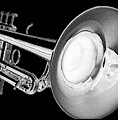

Dean's Greetings
Regular
readers of this publication will already have noticed its striking
new appearance, emblematic of the remarkable vitality of the Oberlin
Conservatory--its faculty, staff, and students, and its extended
community of alumni and friends.
That vitality is evident in the magnificent new C.B. Fisk pipe organ now receiving its finishing touches in Finney Chapel, in the plans for its dedication September 28 and 29, and in the programming opportunities it will offer.
It was also abundantly present on the 17th of October, when the
Oberlin Orchestra performed with two student soloists under the
direction of John Williams at the Getty Center in Los Angeles.
It is evident in the important searches for new faculty in strings,
winds, technology, musicology, music theory, and jazz studies (you
will read about some of them in this issue), and in the record number
of prospective new students inundating the Office of Admissions
with inquiries and applications.
This summer, spacious new facilities for Conservatory admissions
and other administrative offices will be developed on the second
floor of the Oberlin Bookstore, overlooking Tappan Square. This
move echoes history: it was in this very location, albeit in a different
building, that the Oberlin Conservatory was founded in 1865 by two
former students of the Leipzig Conservatory, which itself was established
only 22 years earlier by Felix Mendelssohn. Look for news of this
development in the next issue of Oberlin Conservatory.
Conservatory faculty and staff have also been busy analyzing the
facility needs of the instructional program. Their findings are
now being reviewed by committees of the Board of Trustees and the
College in order to determine how best to serve the program in the
21st century.
We also celebrate the appointment of music educator Dr. Carolynn
Lindeman '62, to the President's Advisory Committee on the Arts
for the John F. Kennedy Center of Performing Arts. Aside from reflecting
the importance of music education to the nation, her appointment
is in keeping with Oberlin's historic and continuing commitment
to the discipline it pioneered in 1921.
Exciting as life and learning are on campus, my time is increasingly
spent traveling and meeting with hundreds of Oberlin's alumni and
friends in support of the New Oberlin Century campaign part
of Oberlin's effort to secure and strengthen its offerings in music
and the liberal arts. The depth of Oberlin's contribution to the
world through the good works, the artistic and intellectual
excellence, and the influence of its graduates everywhere
impresses me more each day. These contributions confirm the words
of a recent distinguished visitor to campus, who characterized Oberlin
as a "missionary institution . . . standing like a beacon on the
hill."
May it always be so.
Robert K. Dodson Dean |